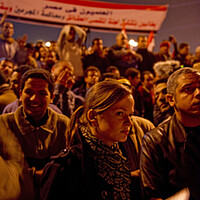With Mosul under siege, an unlikely chance to save ISIS-enslaved Yazidis?
Loading...
| Dohuk, Iraq
Ghazal Salim had spent more than two years in slavery under the so-called Islamic State when her chance for freedom finally came.
As Kurdish and Iraqi forces prepared for the offensive on Mosul in mid-October, her captor, a Jordanian IS fighter, was also making plans for the battle. Along with Ms. Salim – one of the thousands of Yazidi women and girls taken by IS in 2014 – he took his wife and child from Mosul, where they lived, to Raqqa, the de facto IS capital in Syria.
There he told Salim to contact her family. He sold her and her young son to them for $25,000, she said, and in turn used the money to send his wife and daughter back to Jordan. He then returned to Mosul, intent on dying as a suicide bomber in the fight against Iraqi forces.
Salim is one of only a small number of IS slaves who have been rescued or escaped since the battle in Mosul began in October. Many of the family members of the estimated hundreds of Yazidi captives held in the city were hopeful that the offensive would bring freedom to their relatives. So far, they have been bitterly disappointed.
IS members in Mosul appear to have moved most of their slaves to Syria before the fighting began, say those working to document and free the captives. No captives have been found in the towns retaken from the militants, though 18 Yazidis were able to flee to safety amid heavy fighting in Tal Afar, west of Mosul, last week.
That angers activists, who criticize Iraqi forces for not cutting Mosul off from Syria to the west before attacking, leaving a corridor for the militants to send the captives farther away into Syria. Bahzad Farhan Murad, who has painstakingly documented crimes against the Yazidi ethno-religious minority, says captives whose families knew they were in Mosul have shown up in the online marketplace in Syria, showing the militants moved them before the battle.
“Always when the [IS] fighters are withdrawing, they keep the Yazidi girls, they take them with them. They never leave them in areas that are liberated,” he says.
But the enslaved Yazidis' relocation to Syria brings some hope. In Syria, slaves are bought and sold more openly than in Iraq. That makes the rescue of some possible via a complex network of people who buy the slaves and then smuggle them to Kurdish territory. Activists and family members hope that those brought to Syria from Iraq will be able to eventually be rescued, as Salim was.
Freeing enslaved Yazidis
When IS captured a large swath of northern Iraq in August 2014, the militants killed thousands of Yazidis, members of a religious minority with pre-Islamic roots whom the militants consider infidels. Men were gunned down and buried in mass graves, while women and children, and some men, were taken captive. Many of the women were forced into sexual slavery.
More than 2,700 have since been rescued or escaped, while more than 3,600 are still enslaved, said Hussein al-Qaidi, director of the Office of Kidnapped Affairs of the Kurdish regional government. More have been rescued from Syria than from Iraq, though he won’t discuss the details of the rescues and said his office does not deal with IS militants directly.
None of those working to rescue Yazidis will openly discuss how they are freed from Syria, but anonymously, activists say that people in their networks often buy the women and children from IS fighters before smuggling them back to safety. Some in bondage are also rescued or escape without payment, or, as in Salim’s case, bought by their families.
This is made possible by militants in Syria listing the captives, with pictures and prices, in an online marketplace on an encrypted messaging application. That allows families to find their missing loved ones, and activists to make contact with their captors.
But such online marketplaces were not used to the same extent in Iraq, say activists. “Seventy-five percent of the girls who come from Syria, we buy them. In Iraq it’s not like that,” says one activist who asked to remain anonymous.
'I thought I would never make it'
In all cases, the rescues are dangerous. Salim, who was captured with her husband and two small children in Sinjar in 2014, said she witnessed the execution of people accused of helping to free Yazidi slaves. After her capture, she was held for around a year in a series of prisons, some underground. Then she was taken by an IS commander to Deir Ezzour, Syria. About a year ago, she says, he sold her to the Jordanian fighter, who brought her to live in Mosul, along with her young son.
On a visit to Raqqa with her captor, she says, an American IS fighter who went by the name Abu Osama, a comrade of her Jordanian captor, publicly beheaded a man accused of working to free Yazidis. The captives were often forced to watch such executions, she says, to dissuade them from attempting to escape.
In early October, “there was talk that the operation would start, so [the Jordanian] decided to send his family to safer place,” she says softly, soothing her two children as they fussed. “He brought all of us to Raqqa. After that he opened the Internet for me, and I contacted my family.”
He bargained with her family before settling on a price. After receiving the money, he sent her with a smuggler, who led her on foot to Kurdish territory and the freedom that she had thought would never come. “I thought I would never make it,” she says.
She now lives in a refugee camp with relatives, hoping the offensive will also bring liberation for her husband, whom she last saw 1-1/2 years ago.








